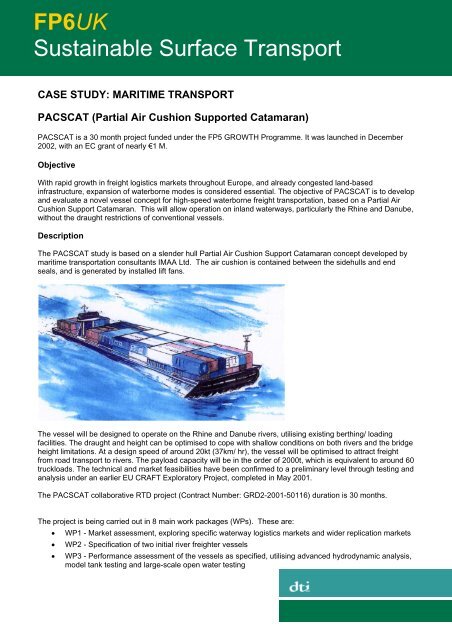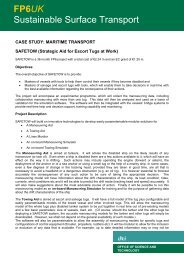FP6UK - Marine Technology
FP6UK - Marine Technology
FP6UK - Marine Technology
You also want an ePaper? Increase the reach of your titles
YUMPU automatically turns print PDFs into web optimized ePapers that Google loves.
<strong>FP6UK</strong><br />
Sustainable Surface Transport<br />
CASE STUDY: MARITIME TRANSPORT<br />
PACSCAT (Partial Air Cushion Supported Catamaran)<br />
PACSCAT is a 30 month project funded under the FP5 GROWTH Programme. It was launched in December<br />
2002, with an EC grant of nearly €1 M.<br />
Objective<br />
With rapid growth in freight logistics markets throughout Europe, and already congested land-based<br />
infrastructure, expansion of waterborne modes is considered essential. The objective of PACSCAT is to develop<br />
and evaluate a novel vessel concept for high-speed waterborne freight transportation, based on a Partial Air<br />
Cushion Support Catamaran. This will allow operation on inland waterways, particularly the Rhine and Danube,<br />
without the draught restrictions of conventional vessels.<br />
Description<br />
The PACSCAT study is based on a slender hull Partial Air Cushion Support Catamaran concept developed by<br />
maritime transportation consultants IMAA Ltd. The air cushion is contained between the sidehulls and end<br />
seals, and is generated by installed lift fans.<br />
The vessel will be designed to operate on the Rhine and Danube rivers, utilising existing berthing/ loading<br />
facilities. The draught and height can be optimised to cope with shallow conditions on both rivers and the bridge<br />
height limitations. At a design speed of around 20kt (37km/ hr), the vessel will be optimised to attract freight<br />
from road transport to rivers. The payload capacity will be in the order of 2000t, which is equivalent to around 60<br />
truckloads. The technical and market feasibilities have been confirmed to a preliminary level through testing and<br />
analysis under an earlier EU CRAFT Exploratory Project, completed in May 2001.<br />
The PACSCAT collaborative RTD project (Contract Number: GRD2-2001-50116) duration is 30 months.<br />
The project is being carried out in 8 main work packages (WPs). These are:<br />
• WP1 - Market assessment, exploring specific waterway logistics markets and wider replication markets<br />
• WP2 - Specification of two initial river freighter vessels<br />
• WP3 - Performance assessment of the vessels as specified, utilising advanced hydrodynamic analysis,<br />
model tank testing and large-scale open water testing<br />
OFFICE OF SCIENCE AND<br />
TECHNOLOGY
• WP4 - Operations assessment including risk assessment and human factors for PACSCAT craft<br />
operation, and definition of operating envelopes compliant with regulatory limits<br />
• WP5 - Detailed design of initial PACSCAT river freighters in accordance with above outputs<br />
• WP6 - Cost-effectiveness appraisal based on actual yard cost modelling for construction using WP5<br />
outputs, and operating cost estimates resulting from WP3 and WP4 outputs<br />
• WP7 - Commercialisation planning, to address initial introduction of PACSCAT and subsequent<br />
replication<br />
• WP8 - Dissemination of PACSCAT achievements to a wide range of operators and other actors<br />
A series of successful model testing campaigns in UK and Germany has recently delivered encouraging results<br />
to the project consortium. In parallel, market appraisal and route evaluation work is underway at the Institute of<br />
Shipping & Logistics in Bremen, with support from intermodal specialists MDS Transmodal and from the<br />
German freight logistics company Sovtransavto.<br />
Participants<br />
The PACSCAT project is being undertaken by a European consortium spanning the complete value chain from<br />
vessel designer to operator, and including interfaces with key regulatory authorities. The project is led by the<br />
University of Southampton with management assistance from <strong>Marine</strong>tech South Ltd. Scientific and Technical<br />
coordination rests with Independent Maritime Assessment Associates (IMAA) Ltd who developed the PACSCAT<br />
concept. Other participants include:<br />
� Avon Fabrications (Checkmate), UK<br />
� CETEC Consultancy, UK<br />
� Shipbuilders & Shiprepairers Association, UK<br />
� The Institute of Shipping Economics & Logistics (ISL), Germany<br />
� Witt & Sohn, Germany<br />
� Wartsila Propulsion, Netherlands<br />
� Germanischer Lloyd<br />
� European Dev. Centre for Inland & Coastal Navigation (VBD), Germany<br />
� MDS Transmodal, UK/France<br />
� Sovtransavto Deutschland, Germany<br />
� Maritime Simulation Rotterdam (MSR), Netherlands<br />
Commercial benefits<br />
� Expansion of time-sensitive logistics capacity on water-borne modes<br />
� Enabling modal shift from roads to water, with resulting reduction in congestion and pollution<br />
� Advancing capability to design low-wash, high-speed vessels<br />
� Improved knowledge of logistics market sensitivities in the context of sustainable transport infrastructure<br />
developments<br />
Further information on PACSCAT can be obtained from:<br />
Jonathan Williams, <strong>Marine</strong>tech South<br />
Tel: 023 8059 6045; e-mail: md@marinetech.co.uk<br />
John Lewthwaite, Independent Maritime Assessment Associates (IMAA) Ltd<br />
Tel: 01329 663202; e-mail: imaa.co@ntlworld.com<br />
For further information on opportunities for maritime and waterborne transport technologies in FP6, contact:<br />
Cliff Funnell – UK FP6 Sustainable Surface Transport (Maritime) NCP<br />
Tel: 01243 552921<br />
e-mail: cfa@marinetechnology.co.uk<br />
Web: http://fp6uk.ost.gov.uk or http://www.marinetechnology.co.uk




